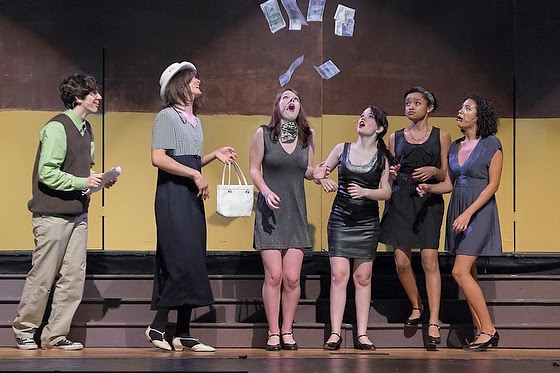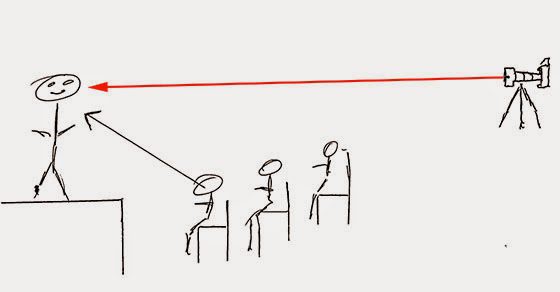 |
| Nikon D750, Sigma 120-300mm ƒ/2.8 DG OS HSM | S, Sigma TC-2001 2x, ISO 12800, ƒ/5.6, 1/200 |
If you were in the front row of the theater, you would not see this photo. The reason is simple. The actor is lying on the stage just above the orchestra pit area.
I like to go to the very back of the auditorium to shoot photos of theater productions at my daughter’s high school. I can even stand if I need to because no one is behind me.
 |
| Fuji X-E2, Fuji XF 55-200mm, ISO 6400, ƒ/6.4, 1/55 |
Here is another photo of the same theater. Again, you can see people in the front few rows below the stage.
 |
| Fuji X-E2, Fuji XF 55-200mm, ISO 6400, ƒ/4.4, 1/400 |
Now the downside to being in the back of the room means you will need longer glass than a kit lens.
 |
| Nikon D750, Sigma 120-300mm ƒ/2.8 DG OS HSM | S, Sigma TC-2001 2x, ISO 9000, ƒ/5.6, 1/500 [600mm] |
I love shooting with the Sigma 120-300mm ƒ/2.8 DG OS HSM | S and the Sigma TC-2001 2X converter. It lets me close like in this photo from the Little Shop of Horrors at Roswell High School.
Most of the photos I take are between 200mm to 600mm.
 |
| Nikon D750, Sigma 120-300mm ƒ/2.8 DG OS HSM | S, ISO 2200, ƒ/2.8, 1/500 [300mm] |
I took the 2X converter off and zoomed all the way in to get this photo.
I highly recommend shooting with a monopod to keep the camera steady, and also, that is one big beast with a Nikon D4, Sigma 120-300mm ƒ/2.8 DG OS HSM | S, and the Sigma TC-2001 2x.
This lens combination is excellent with many events and situations other than sports or wildlife.
 |
| Nikon D750, Sigma 120-300mm ƒ/2.8 DG OS HSM | S, Sigma TC-2001 2x, ISO 2000, ƒ/5.6, 1/100 [550mm] |
Theater Camera Gear Recommendations:
- Nikon 28-300mm ƒ/3.5–5.6
- Sigma 120-300mm ƒ/2.8 DG OS HSM | S
- Sigma TC-2001 2X
- Sigma TC-1401 1.4X
- Nikon D750
- Manfrotto 294 Aluminum 4 Section Monopod
- Manfrotto by Bogen Imaging 323 RC2 System Quick Release Adapter w/200PL-14
- Fuji X-E2
- Fuji XF 18-55mm
- Fuji XF 55-200mm
 |
| Nikon D750, Sigma 120-300mm ƒ/2.8 DG OS HSM | S, Sigma TC-2001 2x, ISO 7200, ƒ/5.6, 1/500 [550mm] |
- Auto ISO – when shooting, check the LCD and use the EV dial to under or overexpose to compensate.
- Check Histogram for accuracy.
- Use Blinking Highlights to let you know what has no details. Be sure faces always have detail.
- Custom White Balance for “White Light” if possible. Many theater lighting schemes use a lot of colors, be careful that you are balancing the lights without gels.
- Tungsten is often the correct white balance for theater lighting–but not always. Don’t try and color correct every scene when the lights are often intentionally giving a color cast.
- Scene brightness will change the color temperature as well. For example, a dimmer set at 10% will make the light more orange than 100% brightness.
- Try to use a shutter speed that is closest to the focal length. If 200mm, use 1/200, and if 500mm, then use 1/500. Possible movement is why having a monopod will let you shoot darker scenes to help keep the camera steady.



